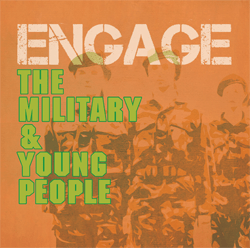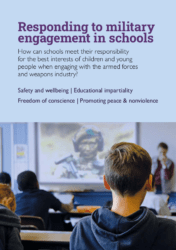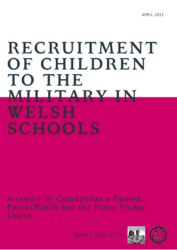Engage: the Military and Young People – discussion points

A short film made by Headliners and ForcesWatch, 2014
Why does the UK military have a ‘youth engagement’ policy and why is the UK government promoting ‘military ethos’ within education? What is the impact of military activities taking place in schools? ForcesWatch and Headliners worked with a group of young people in London to produce this short film which explores these questions.
The film focuses on military activities in schools, including presentations by the armed forces and cadet forces, and the Department for Education’s ‘Military Ethos in Schools’ policy. It looks at young people’s experiences and views and ask questions about the agenda behind the ‘youth engagement’ policy and the reluctance of the Department for Education and Ministry of Defence to discuss this with young people themselves.
Background
The armed forces have a growing involvement in secondary schools, colleges and even primary schools. While the Army, Navy and RAF have long run activities in schools as part of the Ministry of Defence’s Youth Engagement programme, the Department for Education began to promote a ‘military ethos’ within education in 2012.
The UK armed forces make 11,000 visits to schools and colleges annually. Far more state schools are visited than private, and in some areas almost every school is visited, often numerous times each year. Visits include: • careers related activities (careers events, presentations etc) • curriculum related military-focused materials • student development of the students (team building, leadingship, interview techniques etc) • physical activity • interviews for Insight courses (pre-recruitment courses at armed forces bases) • sessions with staff • visits to bases and military museums • work experience.
The MoD state that they do not recruit in schools, specifying that, “no pupil or student is ever ‘signed-up’ or otherwise makes a commitment to become a recruit into the Armed Forces during the course of any school visit”. However, it is clear from their own policies that long-term recruitment is one of the main outcomes of such visits, along with raising ‘positive awareness’ about the armed forces.
The Department for Education’s Military Ethos in Schools programme includes:
• ‘alternative provision with a military ethos’ for students at risk of failing and for whole classes/schools
• the expansion of the Combined Cadet Force in state schools
• the development of military-sponsored free schools and academies
Discussion points
1. Was the film biased for or against the military’s youth engagement (and the cadets in particular)?
2. Has the film changed your views about the military, their youth engagement activities, or the cadets specifically?
3. The Department for Education refused to give an interview for the film and the Ministry of Defence and the armed forces said they willing to give one but never did. What does this make you think?
4. The film argues that cadets are not encouraged to look at the negative realities of life in the armed forces: their military training is detached from the human impacts of war, as seen in the enjoyment one cadet takes from rifle training, and the excitement of another about having met members of the armed forces “doing great things” like “going on tour”. The latter says that the armed forces “are just like us: any job has its bad aspects”. Do you agree? See our reports on some of the risks and downsides of joining the armed forces, from mental health conditions to the much higher risk of being killed if you join the Army at 16.
5. The film suggests that cadets are more likely to consider a career in the armed forces. The military say that the cadet forces are not being used to recruit future soldiers. What do you think about this?
6. Can you see any problems with the aim of the military’s youth engagement to give young people a positive view of the military so they will be supportive of the armed forces as adults?
7. The film suggests that the Woodcraft Folk is one non-military alternative to the cadets. Can you think of any others?
Further information and resources
Welsh language: Download this text in Welsh. Watch the film with Welsh subtitles.
For more background information, download our leaflet Should the military be promoted in schools? and our briefing Military involvement in education and youth activities in the UK.
The film was crowdfunded by over 100 people. Thanks to all those who supported this project.


